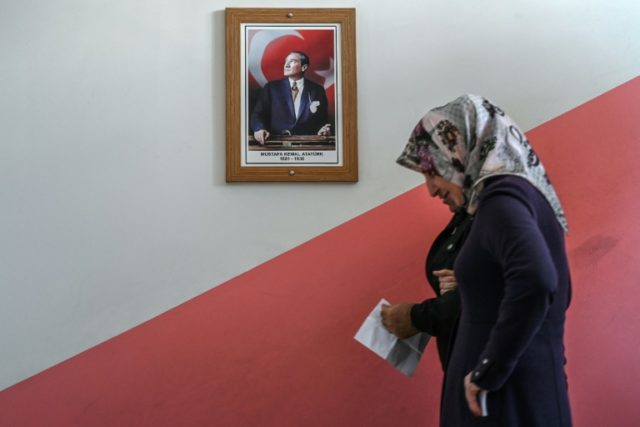Istanbul (AFP) – Turkish President Recep Tayyip Erdogan’s AKP was trailing in a very tight race for the capital Ankara in Sunday’s local elections, state media reported, in what would be a major defeat for the ruling party after a decade and a half in power.
With 75 percent of the ballot boxes counted, the opposition CHP candidate for Ankara mayor was ahead with 49.81 percent of votes. the AKP close on 47.82 percent, Anadolu state agency reported citing initial results.
The AKP candidate for Istanbul mayor was ahead with 49.68 percent of votes to the CHP’s 47.77 percent, with 88 percent of ballot boxes opened, it said.
Erdogan and his Justice and Development Party (AKP) have won every vote since the party first came to power in 2002, but this time, analysts say, the party risked losing Ankara and faced a challenge in Istanbul as an economic slowdown took hold.
Sunday’s poll was the first municipal ballot since Turks approved constitutional reforms in 2017 to create an executive presidency that gave Erdogan wider powers after 16 years in office.
But Erdogan, whose ability to win continuously at the polls is unparalleled in Turkish history, was more vulnerable with the economy in recession, unemployment higher and inflation in double digits.
Voting closed at 1400 GMT in Sunday’s local elections, which were held mostly without incident, with the exception of the deaths of two men killed in a fight at a polling station in the east of Turkey.
Much of the AKP’s success has been down to Erdogan’s perceived economic prowess, but days before the vote, the Turkish lira was sliding again, provoking memories of the 2018 currency crisis that badly hurt Turkish households.
Erdogan, who began his own political career as Istanbul mayor, personally campaigned hard across Turkey, often with several rallies a day, even though he was not on the ballot.
Looking to galvanise his base among conservative Turks, the president cast the election as a matter of survival, attacking opposition candidates by branding them as linked to PKK Kurdish militants.
But for voter Husnu Acar, 53, casting his ballot at a school in Beylikduzu on the outskirts of Istanbul, “they (AKP) are the ones with a survival problem.”
“The economy is terrible,” he said.
Voters on Sunday elected scores of mayors, municipal councils and other local officials.
In Istanbul, the country’s biggest city and economic hub, Erdogan fielded one of his loyalists, former prime minister Binali Yildirim.
But in Ankara, Mansur Yavas — the candidate for both the opposition Republican People’s Party or CHP and the nationalist Good Party — had been slightly ahead in some recent opinion polls.
During voting, two members of Saadet (Felicity), a religiously conservative party, died after a fight between two groups in Puturge in eastern Turkey, private DHA news agency reported. The Malatya governorate said four individuals were detained.
– Economic worries –
For his supporters, Erdogan remains the strong leader they believe Turkey needs and they tout the country’s economic development over the years he and the AKP have been in power.
But rights activists and even Turkey’s Western allies say that under Erdogan’s leadership, democracy has been eroded, particularly after a failed 2016 coup that led to tens of thousands of people being arrested.
“The economy isn’t doing so good for sure, but I have confidence in our president and things will be better after the election,” said Koksal Karacan, a retiree voting in Istanbul’s Kasimpasa, where Erdogan grew up.
The vote was the first time since 2002 that the AKP is fielding candidates with its alliance partner, the rightwing Nationalist Movement Party (MHP).
The opposition pro-Kurdish Peoples’ Democratic Party (HDP) has refused to field candidates in several cities, saying the elections are unfair. Some of its leaders have been jailed on terror charges, accusations they reject.
Observers say that with most media pro-government, opposition parties campaigned at a disadvantage because Erdogan’s daily rallies dominated TV coverage.
With inflation at just under 20 percent and unemployment at a near 10-year high in December, Erdogan had sought to reassure voters about the economy. He blamed the lira currency fall on a campaign to undermine Turkey, led by the United States.
Turkey’s finance minister Berat Albayrak, who is Erdogan’s son-in-law, has said economic reforms would be announced the week of April 8.

COMMENTS
Please let us know if you're having issues with commenting.